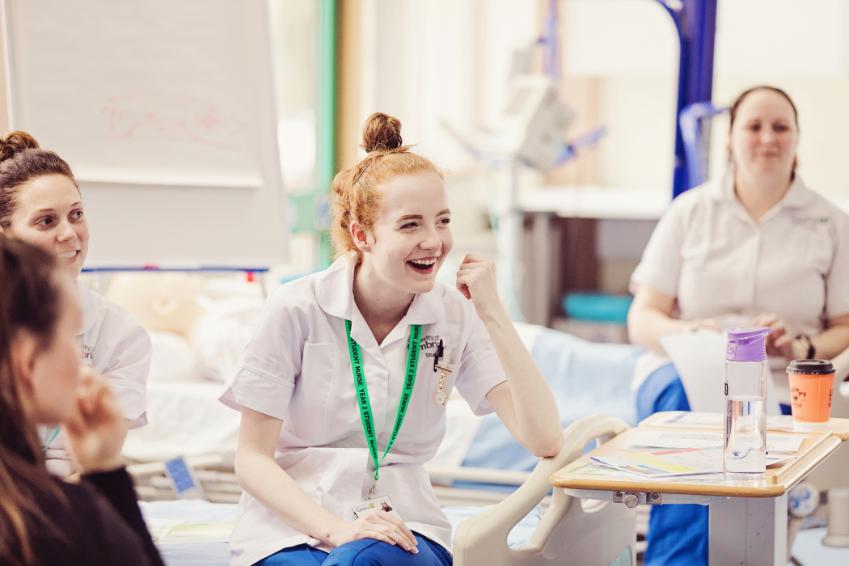BSc (Hons) - Mental Health Nursing
Would you like to improve the lives of individuals experiencing mental illness? Our Mental Health Nursing degree prepares you to become a skilled and highly sought-after mental health nurse.
You will immerse yourself in our student nurse community and take full advantage of our on-campus clinical skills and simulation facilities, which provide the opportunity to develop your skills and confidence in a safe and supportive environment. This includes using digital simulation as well as our simulated ward areas, high-dependency care areas, home spaces, and cutting-edge immersive simulation room.
Alongside this, you will spend equal time on clinical placement in a variety of settings, including inpatient hospital care, dementia care, community, and specialist mental health provision. You will care for individuals across the lifespan who are experiencing different mental health conditions, and our unique campus locations mean you will gain wide-ranging experience working with diverse patient groups in both rural and city areas.
Our academic team are experienced practitioners with a wide range of clinical backgrounds and academic interests. As well as delivering theoretical teaching based on the latest evidence and research, they will support you throughout your degree to ensure your student experience is fulfilling and enjoyable.
The NHS Learning Support Fund, offering at least £5,000 per year, is available to eligible students. For more information and details of eligibility, visit nhsbsa.nhs.uk/lsf.
Course Overview
Mental health nurses provide support and care to vulnerable individuals across all stages of life. Our Mental Health Nursing degree combines essential nursing values with contemporary knowledge, communication and interpersonal skills to help you start your dream career in mental health nursing.
You'll learn through a mix of lectures, workshops, guest speakers, and interactive discussions, gaining insights from academics and professionals with real-world expertise. You'll also develop your clinical skills through scenario-based experiences in mock hospital wards, computerised simulations, and our interactive immersive room.
Upon completing this course, you will be eligible to register with the Nursing and Midwifery Council, enabling you to practise as a mental health nurse. This degree opens doors to diverse career opportunities in settings such as inpatient and community services, and specialist centres of excellence like eating disorders, memory assessment, drug and alcohol, and forensic and prison services.
If you have completed an FdSc Nursing Associate programme, you can enter directly into the second year of this degree, allowing you to qualify as a mental health nurse in just two years.
On this course you will...
- Work alongside individuals experiencing mental illness, long-term conditions, and significant psychological wellbeing concerns, providing time and support to help them recover.
- Use high-quality simulation facilities alongside your practice experience and academic lectures.
- Undertake placements in a wide variety of settings, covering child, adult and older people nursing, within both inner-city and rural locations.
- Learn from experienced practitioners with clinical experience in a wide range of clinical backgrounds and academic interests.
- Hear first-hand accounts of stories in healthcare from individual lived experiences.
- Achieve a professional qualification as a registered mental health nurse, alongside a varied experience of practice areas with which you can consider your future career options.
What our students and graduates say
-
![Catherine Hind, Mental Health Nursing]()
My tutors are amazing! They take time to get to know all their students personally, take an interest in us and then support us with our own ambitions. They are so invested in us and so supportive, it would be hard not to form a strong bond with them.
Catherine Hind, Mental Health Nursing
Nominated for the RCNi Andrew Parker award for Student Nurse of the year, as well as the Student Nursing Times Awards 'Most Inspirational Student Nurse of the Year', Catherine proved to everyone what an extraordinary person she is.
Experience Cumbria
.jpg)


.png)
Location
Carlisle - Fusehill Street Campus
The Fusehill Street campus has been the setting of life-saving treatments since World War I. Now, it's home to world changers, life-savers, crime fighters, and entrepreneurs with access to high-quality facilities and innovative thinking.
Find out moreLocation
Lancaster Campus
Lancaster is the Red Rose heartland, a student haven full of history and culture. With iconic stone architecture, parkland, and a caring community, this is the place to get involved. The campus houses top-quality facilities tailored to the needs of life-savers, world changers, and future leaders.
Find out more
Find out more about studying with us
Attend an Open Day at Cumbria
An Open Day is your opportunity to explore one of 5 campuses, meet your lecturers, and find out how the University of Cumbria could become your new home.


-200x111.png)







.webp)


